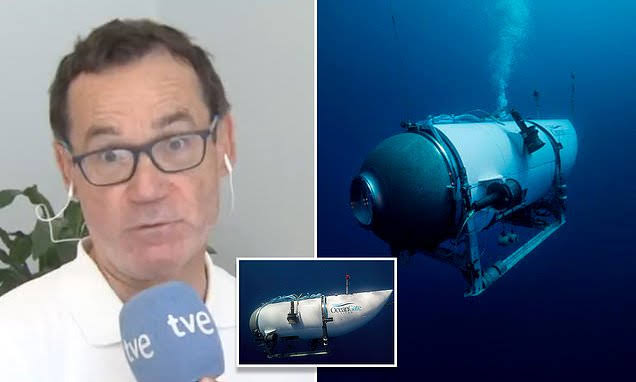The five passengers aboard the Titan submersible which went missing last month would have known their fate for a minute before they died, an expert has said.
Spanish submarine expert José Luis Martín says the submersible, which was on a journey to explore the wreckage of the Titanic, would have ‘popped like a balloon’ after freefalling for around 3,000 feet due to the rapid change in pressure.

He suggested the ‘freefall’ would have lasted between 48 and 71 seconds, with the vessel’s five passengers aware of what was about to happen, the DailyMail reports.
The submersible lost contact with its support ship on June 18, and the implosion is believed to have happened shortly after this.
Its wreckage was discovered days later and all five passengers – Hamish Harding, Shahzada Dawood and his teenage son Suleman, French explorer Paul-Henri Nargeole, and OceanGate CEO Stockton Rush – were killed.
Their deaths were confirmed by the US Coast Guard four days later an an investigation into the disaster is ongoing.

Mr Martín shared his theory about how the submersible failed during an interview with Spanish newspaper Nius.
He said: ‘The starting point is that the submarine is descending without any incident and in a horizontal plane until it reached about 1,700 meters (5,500 feet).
‘At that point, there was an electrical failure. It was left without an engine and without propulsion.
‘That’s when it lost communication with the Polar Prince.
‘The Titan changed position and fell like an arrow vertically, because the 400 kilos of passengers that were in the porthole compromised the submarine. They all rushed and crowded on top of each other.

‘Imagine the horror, the fear and the agony. It must have been like a horror movie.
’Because the Titan lost power and due to the depth of the water, the passengers would have been in total darkness as they sank.
Mr Martín added: ‘In that period of time they are realizing everything. And what’s more, in complete darkness.
‘It’s difficult to get an idea of what they experienced in those moments. After those 48 seconds, or one minute, the implosion and instantaneous sudden death occur.’












